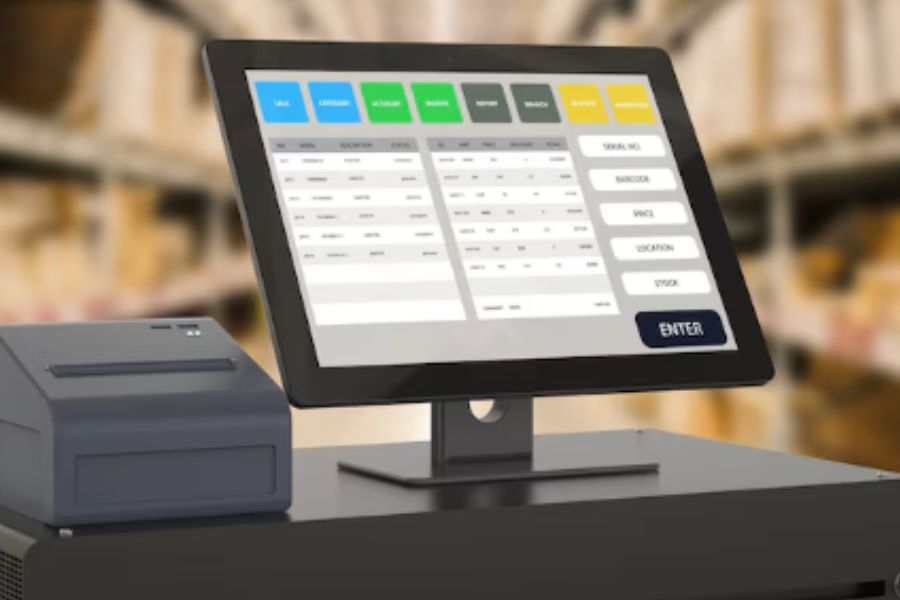In the dynamic landscape of furniture retail, selecting the right point of sale (POS) system for your showroom is pivotal for success. The efficiency of your operations, customer satisfaction, and overall business growth hinge on this crucial decision. In this guide, we will explore the key factors to consider when choosing a furniture retail POS system, ensuring that your showroom embraces a system tailored to its unique needs. Let’s delve into the intricacies of furniture retail POS and how to make the right choice for your business.
Significance of a retail POS system in furniture showrooms
In the ever-evolving landscape of furniture retail, implementing a robust point of sale (POS) system holds significant importance for showroom operations. A furniture retail POS system is a comprehensive software and hardware solution designed to facilitate seamless transactions, efficient inventory management, and enhanced customer interactions within a furniture retail environment.
At its core, a POS for furniture showrooms serves as the central hub for managing various aspects of the retail process. It goes beyond traditional transaction processing by integrating advanced functionalities tailored to the specific needs of furniture retailers. These functionalities include real-time inventory tracking, streamlined checkout processes, and the ability to create and manage customer profiles.
The significance of a retail POS system in furniture showrooms is multi-faceted. Firstly, it ensures efficient transactions, minimizing wait times for customers during the checkout process. This quick and accurate processing of transactions contributes to a positive shopping experience, fostering customer satisfaction and loyalty.
Moreover, a retail POS system plays a crucial role in inventory management. It enables real-time tracking of furniture inventory, providing insights into stock levels and preventing issues such as overstock or stockouts. This feature is particularly essential for furniture showrooms dealing with a diverse range of products, styles, and variations.
Sales optimization is another key aspect facilitated by a furniture store POS system. With a streamlined checkout process and support for various payment methods, including credit cards, debit cards, and mobile payments, the system enhances the overall customer experience. This flexibility in payment options caters to the diverse preferences of modern consumers, contributing to increased sales and revenue.
The significance of a retail POS system in furniture showrooms cannot be overstated. It serves as a comprehensive tool that not only facilitates efficient transactions but also optimizes inventory management, enhances customer relationships, and contributes to the overall success of furniture retail operations. As furniture showrooms navigate the complexities of the modern retail landscape, investing in a robust POS system becomes a strategic imperative for sustained growth and competitiveness.
Guide to selecting the right POS system for furniture retail
In the realm of furniture retail, selecting the right point of sale (POS) system is a critical decision that can significantly impact the efficiency and success of your business. A comprehensive guide to choosing the optimal POS system for furniture retail should encompass various key factors to ensure seamless operations and a positive customer experience. Here’s a breakdown of essential considerations:
- Customization options: Look for a POS system that offers customization options to tailor the interface and features to meet the specific needs of your furniture retail business. This ensures that the system aligns seamlessly with your branding and operational requirements. Furniture retail encompasses diverse operational processes, from managing intricate inventory details to implementing targeted promotions.
- Integration capabilities: Integration capabilities are a cornerstone of selecting the right POS system for furniture retail. The ability to seamlessly integrate with e-commerce platforms and inventory management tools not only streamlines processes and minimizes errors but also provides a unified, real-time view of operations. This strategic integration empowers furniture showrooms to navigate the challenges of the modern retail landscape with agility, efficiency, and a data-driven approach.
- User-friendly interface: Opt for a POS system with an intuitive and user-friendly interface. A system that is easy to navigate and understand ensures that your staff can efficiently use the POS software, minimizing training time and reducing the risk of errors during transactions. ConnectPOS stands out as a leading solution with its emphasis on creating an intuitive and accessible interface. Its user-friendly interface ensures that your staff can quickly adapt to the system, reducing training time and minimizing the likelihood of errors during transactions.
- Reporting and analytics: Robust reporting and analytics features are essential for gaining insights into your furniture retail performance. Look for a system that provides detailed reports on sales, inventory levels, and customer behavior, empowering you to make data-driven decisions. A comprehensive POS system should offer detailed reports on sales performance. This includes insights into the performance of individual products, product categories, and overall sales trends. Retailers can analyze which products are top-sellers, identify seasonal trends, and strategically plan inventory based on historical data.
- Technical support and training: Assess the level of technical support and training offered by the POS provider. A reliable support system and comprehensive training options are crucial for resolving issues promptly and ensuring that your staff is proficient in utilizing the POS system’s features.
- Cost considerations: When embarking on the journey to choose a POS system for a furniture retail business, it’s crucial to have a comprehensive understanding of the overall cost of ownership. This extends beyond the initial setup fees and subscription costs to encompass the total expenses associated with using the POS system over time. Consider factors such as hardware costs, maintenance expenses, and any potential hidden charges that may arise during usage. Assessing the setup fees is the first step in understanding the upfront costs associated with implementing a POS system. These fees often cover the initial installation, configuration, and training processes. Furniture retailers should inquire about one-time setup charges and ensure they align with the budget constraints of the business.
- Connectivity and mobility: In the modern retail landscape, connectivity and mobility are vital. Ensure that the POS system supports various devices and offers mobility features, allowing your staff to access the system from different locations within the showroom. Opt for a POS system with a cloud-based infrastructure. Cloud technology enables seamless connectivity, allowing staff to access the system from any device with internet access. This not only enhances mobility but also facilitates remote management and updates. While connectivity is vital, consider ConnectPOS which offers offline mode capabilities. This ensures that essential functions can still be performed even in the absence of internet connectivity, preventing disruptions during peak business hours. Ultimately, you can sell anywhere and anytime without worrying about losing sales or data.
- Security features: Security is paramount in handling sensitive customer and financial data. Look for a POS system that incorporates robust security features, such as encryption and secure payment processing, to protect against potential threats and breaches. This involves utilizing payment card industry data security standard (PCI DSS) compliance, ensuring that every financial transaction is processed in a secure environment. This not only protects your customers from potential fraud but also shields your business from legal and financial consequences.
- Customer relationship management (CRM): A strong CRM component is essential for building and maintaining customer relationships. The POS system should enable the creation of detailed customer profiles, tracking purchase history, and implementing loyalty programs for personalized services.
- Promotions and discounts: Evaluate the system’s capabilities in implementing promotions and discounts. A flexible POS system allows you to create and manage promotions easily, providing opportunities to attract and retain customers through targeted incentives. Look for a POS system that provides an intuitive interface for setting up promotions. This ensures that your staff can swiftly implement and adjust promotional campaigns based on evolving business needs.
Evaluating ConnectPOS for furniture retail
As furniture retailers strive for operational excellence and seamless customer experiences, the choice of a reliable point of sale (POS) system becomes pivotal. ConnectPOS, a leading solution tailored for furniture retail, offers a suite of features designed to elevate showroom operations. Let’s delve into the key aspects that make ConnectPOS a valuable choice:
- Omnichannel support: ConnectPOS provides robust omnichannel support, seamlessly integrating online and offline channels. This ensures a unified shopping experience for customers, allowing them to transition effortlessly between your physical showroom and online platforms.
- Integration with e-commerce platforms: Excels in integration with popular e-commerce platforms. This feature ensures a synchronized inventory across both online and offline channels, preventing discrepancies and enabling efficient management of product availability.
- Flexible order fulfillment options: Adaptable to showroom preferences: ConnectPOS offers flexibility in order fulfillment options. Whether your showroom prefers in-store pickups, home deliveries, or a combination of both, the system adapts to your specific requirements, providing a tailored and efficient order fulfillment process.
- Customer relationship management (CRM): ConnectPOS places a strong emphasis on customer relationship management. The system enables the creation and management of detailed customer profiles, capturing preferences and purchase history, and allowing for personalized interactions. This feature fosters stronger connections with your clientele.
- Promotions and discounts: ConnectPOS facilitates the implementation of promotions and discounts with ease. Whether you’re running seasonal sales or targeted promotional campaigns, the system empowers your showroom to execute strategic marketing initiatives, enhancing customer engagement and driving sales.
- Secure payment processing: Ensuring secure payment processing is a top priority for ConnectPOS. The system employs robust security features to safeguard sensitive customer and financial data, instilling confidence in both your customers and your business.
Frequently asked questions (FAQs) about furniture retail POS systems
Why is a retail POS system important for furniture showrooms?
A retail POS system is crucial for furniture showrooms for several reasons. Firstly, it ensures efficient and accurate transactions, minimizing wait times for customers during the checkout process. Additionally, it plays a pivotal role in inventory management, providing real-time tracking of furniture inventory to prevent overstock or stockouts. The system also optimizes sales processes, offering a streamlined checkout experience and supporting various payment methods to enhance overall customer satisfaction.
What factors should I consider when choosing a furniture retail POS system?
When selecting a POS for furniture retail, consider key factors such as customization options, integration capabilities, user-friendly interfaces, reporting and analytics tools, technical support and training, cost considerations, connectivity and mobility features, security aspects, and the system’s ability to manage promotions and discounts. Each of these factors contributes to the overall efficiency and success of your furniture retail operations.
Can I customize the furniture retail POS system to suit my showroom’s specific needs?
Yes, customization is a crucial feature for a furniture retail POS. The ability to tailor the system to suit your showroom’s specific needs, including product categories, pricing structures, and branding elements, ensures that the POS system aligns seamlessly with your unique business requirements. This customization empowers you to create a personalized and branded experience for your customers.
How important are integration capabilities with e-commerce platforms?
Integration capabilities with e-commerce platforms are highly important for furniture retailers. Seamless integration between the POS system and e-commerce platforms ensures a unified shopping experience for customers, whether they engage in-store or online. It synchronizes product information, inventory levels, and order processing, allowing for efficient management of both physical and online channels. This integration is vital for tapping into a broader market and staying competitive in the digital retail landscape.
Is a user-friendly interface important for furniture retail POS systems?
Yes, a user-friendly interface is of utmost importance for a POS, especially in a showroom setting. A system with an intuitive and easy-to-navigate design minimizes training time for staff, ensuring that they can efficiently operate the POS system during face-to-face interactions with customers. A user-friendly interface contributes to smoother transactions, reduces errors, and enhances the overall customer experience in the showroom.
Conclusion
Navigating the intricacies of furniture retail POS systems is crucial for showroom efficiency. The outlined guide covers essential factors such as customization, integration, user-friendliness, and more to empower retailers in making informed choices. If you want to delve deeper into enhancing your furniture retail operations, don’t hesitate to contact us. Our experts are ready to assist and provide personalized solutions for your showroom’s unique needs.



